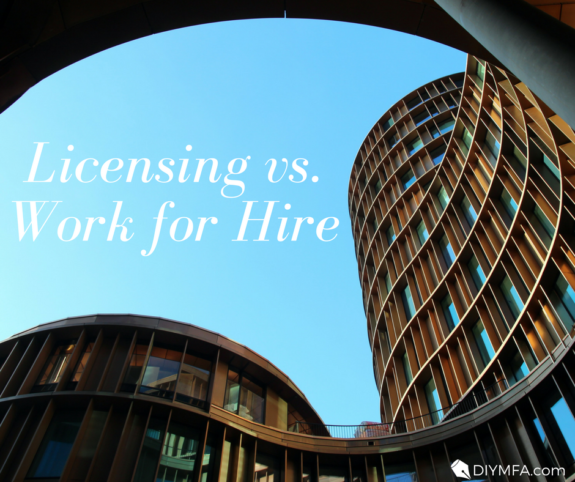One legal distinction that is very important for writers to understand is the difference between licensing and work for hire.
Licensing
In publishing terms, licensing is usually the scenario you find when you publish your work via the traditional route. You query an agent, the agent “sells” the book to a publisher, you sign an contract and sooner or later your book lands on store shelves. But the truth is, you’re not actually selling your book to the publisher; you’re granting the publisher certain specific rights, like the right to publish your book in North America, or the UK, or in digital form. In this case, it’s important to have an agent in your corner to help you negotiate the details of this licensing agreement. After all, you don’t want to sign away all the rights to your work. An agent will help you negotiate that all-important contract so you can rest easy.
Note also, that in the case of licensing, usually payment comes in the form of a royalty (a percentage per each book sold) so in order for the author to make money, the book has to sell. You hear sometimes of authors getting an “advance” but don’t be mistaken… an advance is not “free money.” The term is short for “advance against royalties” which means that the author is getting some portion of the royalty in advance of the books being sold. What this means is that in order for the author to receive any additional royalties, the publisher must first sell enough books to make back the advance given to the author (also called “earning out.”)
Another example of licensing is when you publish a short story in a literary magazine. Most of these magazines offer little or no payment, but they also ask for very little. Usually these magazines only ask for First North American Rights or First Digital Rights (for an online magazine). These rights allow the magazine to print the story first, but after that the rights go back to the author. This means that if you grant a literary magazine only First North American Rights or First Digital Rights, once that magazine has printed your story, you can resubmit it elsewhere or repurpose it. This happens often when authors publish short stories in magazines but later on will anthologize those stories in a collection.
Work for Hire
In the case of work for hire, we usually see this scenario when a publisher or book packager hires a writer to produce a specific piece of writing. For instance, if a writer gets hired to ghostwrite a tell-all celebrity memoir, that would be considered work for hire. Or when a writer is assigned to write book #387 of The Babysitter’s Club that would also be work for hire. After all, the substance of the work (the ideas and information) would be provided to the author so the author’s primary function is to craft and write the piece. Another example of work for hire is when an author is a staff writer for a periodical. Unlike a freelance writer who produces work as an independent contractor the staff writer is an employee, paid a flat fee for the work. Since the writer is an employee, all the work product created by the author for that publication belongs to the publication. In other words, the copyright for the work does not belong to the author but to the publisher.
Take-Home Message:
Whether you are licensing your work to the publisher or selling it outright as work for hire, you will most likely have to sign a contract. Make sure you read the fine-print so you know exactly which rights you are handing over and which rights you get to keep.







